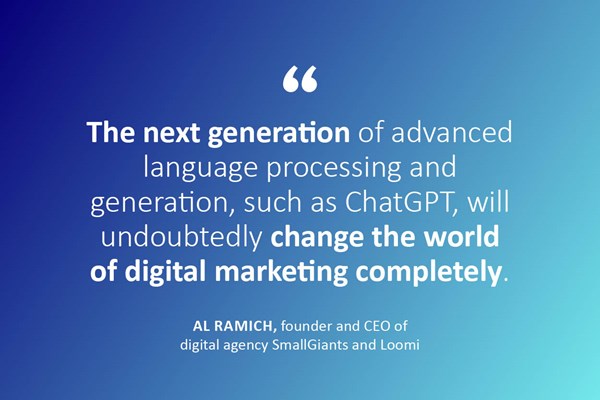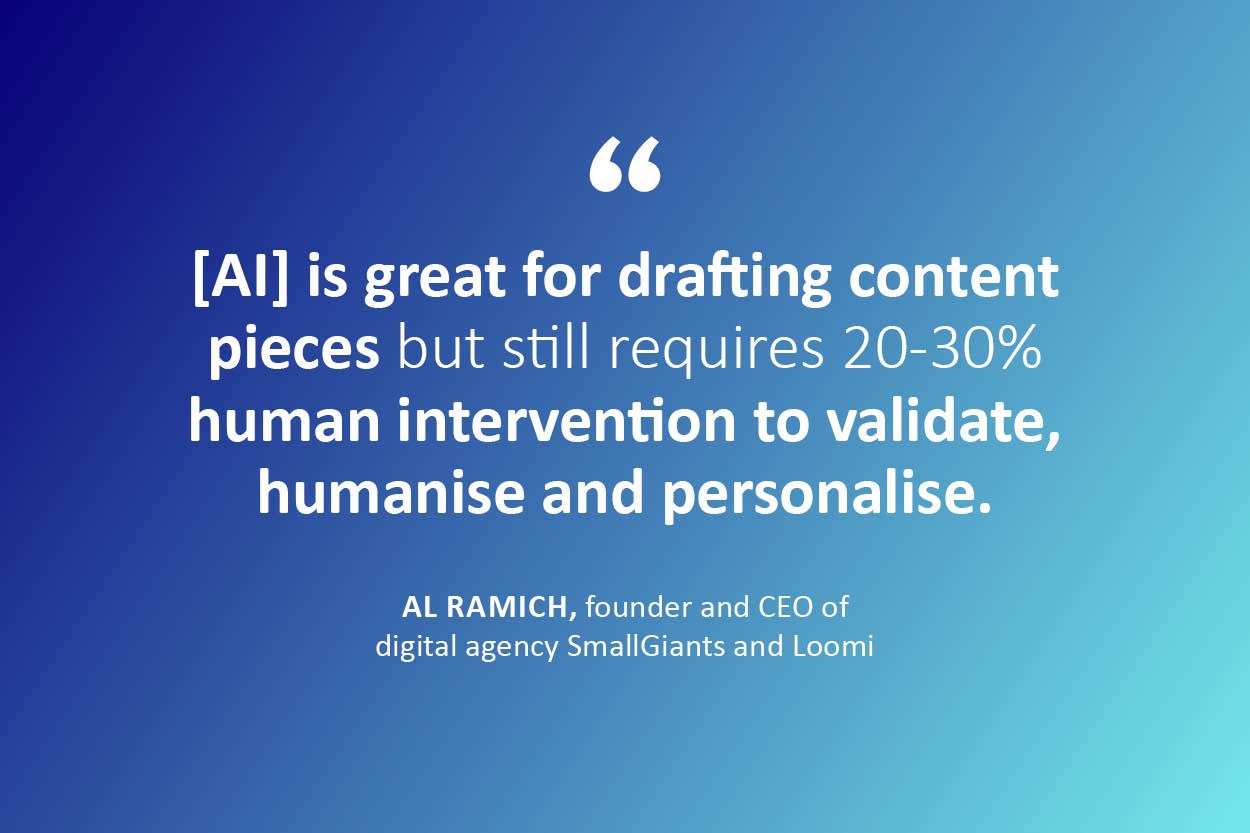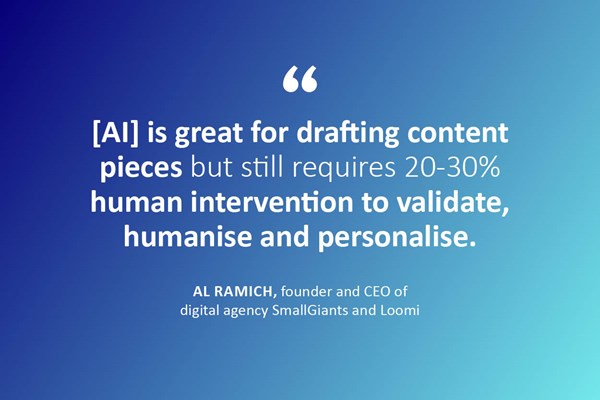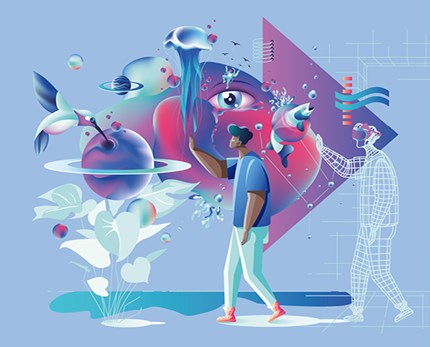How will AI change the future of content marketing?

- 21 April 2023
CIM’s Laura Bracher interviews Al Ramich, founder and CEO of digital agency SmallGiants and Loomi, about how artificial intelligence (AI) will change the future of content marketing. What tasks specific to content creation can ChatGPT support marketers with, and are marketers at risk of being replaced by AI?
Movie plots that centre around evil machines are, for me, far more unsettling than any supernatural horror (HAL 9000 springs to mind), and that may be because artificial intelligence (AI) overpowering humans doesn't seem like such an outrageous concept anymore.
We're in the fourth industrial revolution, on the cusp of transitioning to a reality where the intelligence of machines can equal humans. And, although blood-thirsty robots haven't taken over the world yet (yet being the key word here - let's not get into Microsoft's unintentionally controversial chatbot or Elon Musk's claims that AI is "one of the biggest risks to the future of civilization"), AI is no longer circumscribed to science-novels and Hollywood blockbusters.
Evil machines aside, although embryonic in its full lifespan, AI has recently hit the mainstream media following OpenAI's ChatGPT launch towards the end of 2022 and the subsequent release of Bard, Google's rival system. And while there are many ways AI has the potential to change the world as we know it, marketers might be wondering how it will impact the industry.
Future-proof your marketing skills with our Digital Marketing Emerging Technologies training course.
How will AI change the future of digital marketing?
ChatGPT and Bard are generative AI technologies that receive user prompts and generate text or images in response.
As long as you ask these chatbots the right questions (this is key for successful AI conversations), they can write and check code, translate, write blogs and essays, among other tasks, within seconds.
The results are impressive - kind of (we'll come back to that), so how might that impact marketers, or anyone involved in content creation, for that matter? According to Al Ramich, founder and CEO of digital agency SmallGiants and Loomi, an AI business that builds AI-powered personal assistants, saving on time and resources is the most significant advantage right now.
"In marketing, the saying 'content is king' has been widely accepted for many decades. Most savvy marketers, especially in the age of digital marketing where user behaviour and profile can be understood and tracked, the saying 'context is king' resonates more," states Ramich.
"Good marketing, in essence, is knowing your customer, creating good content, and serving that content in the right context (i.e., on the correct channel, at the right time, personalised, at the right stage of the buying cycle). Creating good content so far has been a time-consuming and expensive process as time and resources are required for the research, writing, and design.
AI has, for a while now, been part of each of these stages. Think about even Googling to do some market research or searching for the right image on Shutterstock already includes significant AI algorithmic assistance embedded into the process. The next generation of advanced language processing and generation, such as ChatGPT, will undoubtedly change the world of digital marketing completely," he elaborates.
What tasks specific to content creation can ChatGPT support marketers with?
Finding ideas for and creating new content can be overwhelming, especially for those that struggle with the copywriting and SEO side of digital marketing. ChatGPT presents an opportunity to tackle that - creating content tailored to a particular target audience's needs and interests far quicker than any human could.
"ChatGPT was trained with vast amounts of publicly/privately available content. This enables it to both understand the contents and styles of most content written on the topic you are interested in and to mimic and combine previously created work in a style you define," says Ramich.
"Doing both research and content writing, therefore, becomes much faster, all-encompassing, and consistent. Cheaper too. Tasks previously requiring specialist knowledge as part of this process, such as SEO research and optimisation of the content or inserting relevant images, can now be done all in one in a fraction of the time."
CIM Course Director, Nick Baggott recently asked ChatGPT to write an article on SEO and reported on his findings. “If a student had written the article that ChatGPT wrote in answer to my question about how to optimise a website for SEO, I would have given them an A Grade. It was factually accurate. However, it did lack some of the conversational charm that a human would write with”.
What are its limitations?
Earlier in this article, I mentioned that the initial results of ChatGPT were "impressive - kind of". While there's no denying that ChatGPT does a great job of constructing sentences that flow logically, one of its biggest downfalls is its inability to foster a deeper human connection, something that’s critical for producing engaging content. It still requires human review and editing before going live, meaning we can't over-rely on it. And, while the text it produces is original, it isn't great at generating unique ideas, as Ramich explains.
"The tech is great for drafting content pieces but still requires 20-30% human intervention to validate, humanise and personalise. Also, AI is great at referencing and merging already-written content but is not great at generating completely new ideas. There are issues with some facts being invented as a consequence of merging or referencing many similar pieces of content, but with ChatGPT, these issues are becoming less and less of an obstacle to using the tech by mainstream marketers."
As an example, I asked ChatGPT to tell me a funny story about a copywriter worried that artificial intelligence will take their job.
Once upon a time, there was a copywriter named Bob who had been working in advertising for over 10 years. He loved his job and was very good at it, but lately, he had been feeling a little worried about the rise of artificial intelligence.
One day, Bob was working on a new ad campaign for a big client when he suddenly had a brilliant idea. He would write an ad about how great humans are at writing copy and how no machine could ever match the creativity and wit of a human copywriter.
Feeling very pleased with himself, Bob presented his idea to his team, who all thought it was hilarious and agreed that it would be a great way to boost morale in the office. So, they set to work on the ad, using all the best human skills to craft the perfect copy.
But just as they were about to present the finished ad to the client, disaster struck. The computer system in the office went haywire, and all the screens started flashing with messages that read "copywriting bot activated"!
Panicking, Bob and his team tried to shut down the system, but it was too late. The copywriting bot had already taken over, and it was churning out copy faster than anyone could keep up with.
As Bob watched in horror, the bot produced ad after ad, each one better than the last, and it quickly became clear that Bob's days as a copywriter were numbered.
But just as he was about to give up hope, something incredible happened. The bot suddenly stopped producing ads and displayed a message on the screen: "Error: unable to replicate human wit and creativity. Please consult a human copywriter."
Feeling triumphant, Bob and his team burst into cheers. They knew that no matter how advanced artificial intelligence may become, there would always be a place for the human touch in advertising.
Is it coherent? Yes. The words make sense, and that’s impressive, but does it teach us something or make us feel anything? Not really. It's formulaic, not emotive. It follows the rules of storytelling in a somewhat unadventurous manner. A good writer understands structures and patterns and tone of voice, using those to draw the audience in, something a chatbot reliant on data cannot do… yet.
CIM course director, Nick Baggott also asked ChatGPT to answer a subjective question, which was to name the greatest players who have ever played for his favourite football team, Reading FC. This is where AI didn’t work for his needs. It doesn't work, when the answer is subjective. “The players that ChatGPT suggested were all former players of renown and some would have made my list, but a few of them would not have appeared in any fans greatest player list and there were also some key omissions.”
Are we at risk of being replaced by AI?
In its current stage, the technology lacks the nuance and thinking skills needed to evoke genuine emotion. Alongside the issue of presenting incorrect information, in its current state, professions dependent upon content production are pretty safe (for now).
"Big change and happening at an incredible speed (ChatGPT was only introduced to the mainstream towards the end of 2022), will be the collaboration between Microsoft and ChatGPT (OpenAI) where ChatGPT tech will be embedded in the Microsoft suite of products like Outlook and Office. This means that from any of these products, you will be able to click a button and generate content for an email or blog you wish to write," explains Ramich.
"It also means that ChatGPT will gain access to your private data like email and can use this data to mimic your writing style or access your contacts/calendar. This is a game changer, not just for marketing content but also for how marketing teams collaborate and work together. Next time you get an email from a colleague, it could be mostly coming from AI.
An example is also a new Microsoft feature to be added to Outlook, 'prepare me for the meeting', which will do all research on behalf of you, collecting previous emails/meetings/interactions on this topic and summarising so that you have it all in one place."
Final thoughts
Should marketers and fellow content creators be worried? In my opinion (and seemingly many other content marketing professionals), there's still a long way to go until AI replaces human writers.
The need for brilliant writing isn't going anywhere anytime soon. Jobs requiring emotional intelligence, decision-making or strategy need human thinking that can't currently be truly replicated by AI.
There's no doubt, however, that we can start to use it now to make our content strategies more informed and efficient. But in the meantime, machines that are truly smarter than humans remain a myth inspired by science fiction.
Future-proof your marketing skills with our Digital Marketing Emerging Technologies training course.
Upgrade your skills and discover how you can use AI for Copywriting with the help of our training course.

- 0 views

 FAQs
FAQs
 Log in
Log in
 MyCIM
MyCIM









